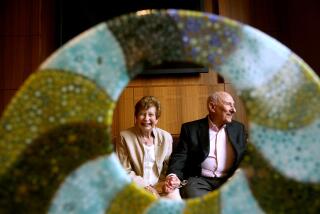Gordon A. Craig, 91; Stanford Historian, Expert on Germany
- Share via
Gordon A. Craig, considered America’s dean of German historians and a respected professor at Stanford University, has died. He was 91.
Craig, perhaps best known for his books “Germany” and “The Germans,” died Oct. 30 of heart failure at the Sequoias, a nursing facility in Portola Valley, Calif., Stanford officials announced.
The prolific writer and educator was described as “the most distinguished historian of modern Germany in this country and possibly one of the greatest in the world” by his colleague Peter Stansky, also a retired Stanford professor of history, in a statement released by Stanford officials.
“He was among a handful of people in the late ‘50s and early ‘60s who ... helped elevate Stanford from a good local university to a great national university,” added James Sheehan, the university’s Dickason Professor in the Humanities.
Author of a dozen books on Germany and editor of many more, Craig concentrated on writing after retiring from Stanford and became a regular contributor to the New York Review of Books. He was also consulted by politicians and the news media on changes in modern Germany, including the nation’s reunification in 1990.
In reviewing Craig’s “Germany: 1866-1945” for the Washington Post in 1979, UCLA history professor Peter Loewenberg said the book carried forward the “study of the integral relationship between military and political affairs and the fabric of German society that has been the hallmark and essential contribution of Craig’s work.”
Loewenberg praised Craig’s “deft and intelligent handling” of historic material and concluded, “Altogether this is the best contemporary statement of modern German history in the classical mode.”
When “The Germans,” something of a companion volume about the character of its people, was published in 1982, it earned Craig nominations for both the Los Angeles Times history prize and the American Book Award in history. British historian and author Gerry Graber, in reviewing the book for The Times, wrote of Craig:
“His special gift is to ask a question, select a theme from German history that is likely to supply the answer and lead the reader through labyrinthine erudition without producing a dry-as-dust result.
“I believe this book comes within the province of popular history and, for my money, is an outstanding, good example of it,” he continued. “There is wit, urbanity and imagination as well as scholarship.”
Craig earned positive reviews of his 1999 book, “Theodor Fontane: Literature and History in the Bismarck Reich.”
A reviewer for the Vancouver Sun described the pairing of author and subject as “the leading American historian on Germany meets Berlin’s best 19th century novelist” and termed the result “a collection of thoroughly readable essays that add up to an informal, and very welcome, biography of the too-little-known Fontane (1819-98). It’s also a book in which historian Craig, now in his mid-80s, displays a lot of the charm of the novelist he’s writing about.”
Among Craig’s other books were “The Politics of the Prussian Army, 1640-1945,” in 1955; “From Bismarck to Adenauer: Aspects of German Statecraft,” in 1958; “Europe Since 1815” in 1961; “War, Politics and Diplomacy” in 1966; and “The Politics of the Unpolitical: German Writers and the Problem of Power, 1770-1871.” Among major books he edited were two with Felix Gilbert, “The Diplomats, 1919-1939,” published in 1953, and “The Diplomats, 1939-1979,” published in 1994.
Craig, a native of Glasgow, Scotland, moved to Canada and then to the United States as a child and earned his bachelor’s, master’s and doctoral degrees at Princeton University. He was also a Rhodes scholar at Oxford University in England. During his college days shortly before World War II, he traveled widely in Germany and was appalled at what he considered abuses of culture as well as human rights.
The scholar was a political analyst for the Office of Strategic Services and worked for the State Department during World War II, and was an officer in the Marine Corps.
He taught briefly at Yale and for 20 years at Princeton before joining the Stanford faculty in 1961. He chaired Stanford’s history department from 1972 to 1975 and again from 1978 until his retirement in 1979, and was president of the American Historical Assn. in 1981.
Craig is survived by his wife of 66 years, Phyllis; three daughters, Deborah Preston of Los Altos Hills, Susan Craig of Pasadena and Martha Craig of Peoria, Ill.; one son, Charles of South Pasadena; a sister, Jean Clarke of Ontario, Canada; eight grandchildren and two great-grandchildren.
A campus memorial service will be planned early next year. The family has asked that any memorial donations be made to a charity of the donor’s choice.
More to Read
Sign up for our Book Club newsletter
Get the latest news, events and more from the Los Angeles Times Book Club, and help us get L.A. reading and talking.
You may occasionally receive promotional content from the Los Angeles Times.







